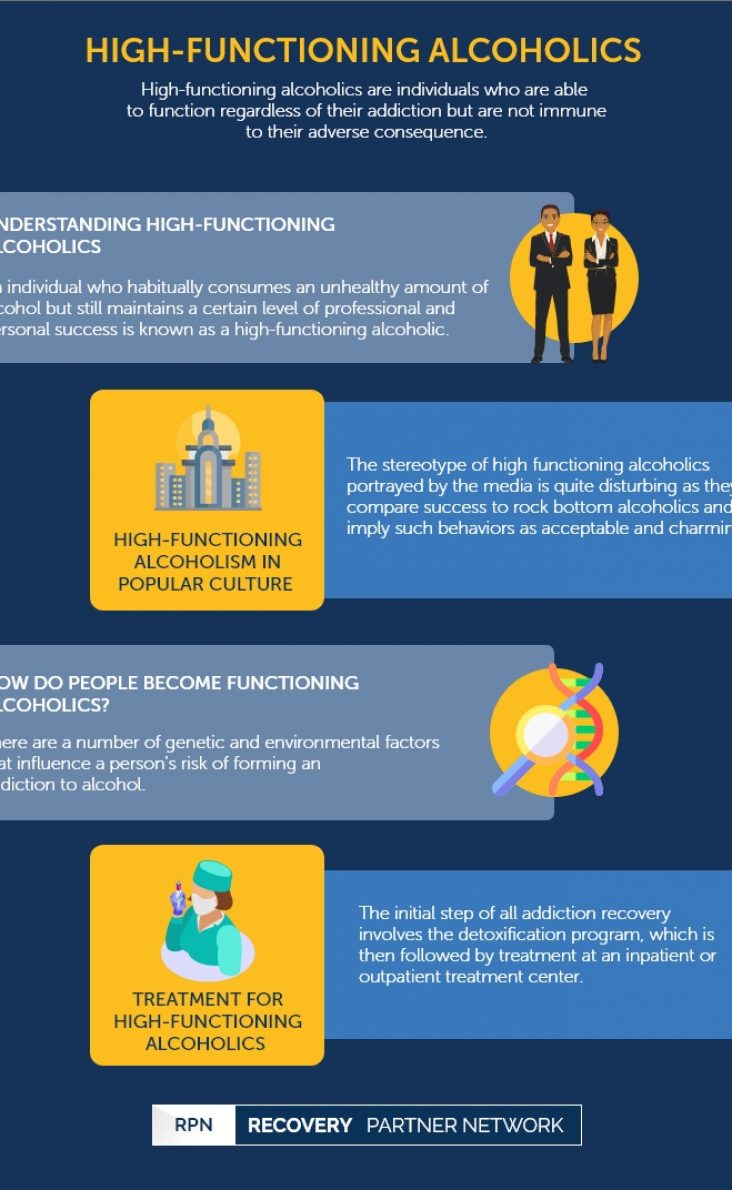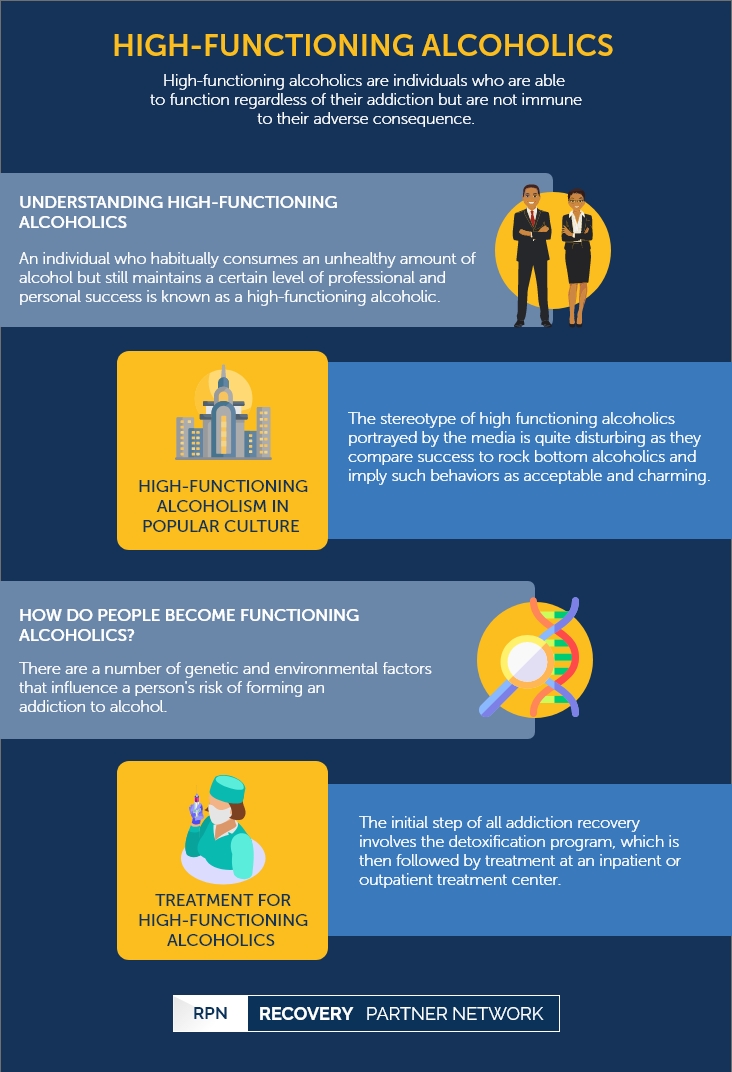High-functioning alcoholics are individuals who are able to function regardless of their addiction but are not immune to their adverse consequence.
High-Functioning Alcoholics
High-Functioning Alcoholism | Table of Contents
Understanding High-Functioning Alcoholics
An individual who habitually consumes an unhealthy amount of alcohol but still maintains a certain level of professional and personal success is known as a high-functioning alcoholic. As per a government survey, it has been estimated that around 20 percent of alcoholics in America are high-functioning alcoholics Since these individuals are successful at home and work, it is difficult for their family and friends to recognize the signs of alcohol abuse.
Although these individuals appear to lead a successful and content life, they usually hide their personal struggles with alcohol abuse from friends and family effectively. Some may even wrongly owe their success to alcohol as they presume it helped them through difficult times or made them more social. Unfortunately, most of these high-functioning alcoholics are genuinely unaware of the impact their behavior has on their loved ones.
It is crucial to understand that these individuals achieved their success in spite of and not because of alcohol use. Regardless of the many personal and professional successes, prolonged alcohol consumption can lead to serious health issues and adverse consequences. For example, high-functioning alcoholics are highly likely to develop cirrhosis due to binge drinking. Unfortunately, the denial of the user and those around them often hold back high-functioning alcoholics from ever pursuing treatment.
High-Functioning Alcoholism in Popular Culture
The media often portrays a high-functioning alcoholic as a revered and celebrated character. Popular TV programs such as “Mad Men” portray high-functioning alcoholics as lawyers, bankers, advertising executives, and financial advisors who seem to maintain a healthy balance between success and alcohol without any adverse outcomes. This stereotype is quite disturbing as they compare success to rock bottom alcoholics and imply such behaviors as acceptable and charming. However, this cannot be further from reality.
No matter what one has achieved in terms of personal success, each and everyone is vulnerable to the mental and physical harms caused by alcohol, including liver and brain damage, cancers, and strokes.
FAQ
The construction and mining industries possess some of the highest rates of alcohol abuse. Exposure to these particular substances within the workplace or industry culture may be to blame, as well as the stress and pressure that is unique to those types of professions.
People who have certain variations in their genes which produce alcohol dehydrogenase enzymes are less able to tolerate alcohol. However, environmental factors, such as previous exposure to alcohol, may also play a role in a person’s alcohol tolerance.
Signs of High-Functioning Alcoholism
As high-functioning alcoholics develop a tolerance to the sedative effects of alcohol, they may not appear intoxicated. However, there are a few other signs that make it easy to detect alcoholism.
Signs of alcohol abuse may include:
- Drinking alone or starting the day with a drink.
- Having memory lapses while drinking.
- Causing friends and family to make excuses for their behavior.
- Using alcohol to relax or feel confident.
- Hiding alcohol at home and work.
- Denying having a problem with alcohol and getting angry when confronted.
- Unexplained absence.
- Drinking when they had not intended to.
- Joking about having alcoholism or a drinking problem.
- Multiple records of DUI arrest.
FAQ
Long-term effects of alcohol abuse may include high blood pressure, stroke, liver damage, and various forms of cancer.
Alcohol is eliminated from the bloodstream at about 0.015 per hour. Alcohol can be detected in a blood test for up to 12 hours and a urine test for up 3 to 5 days.
How Do People Become Functioning Alcoholics?
Certain individuals develop an addiction to alcohol rather quickly, while others develop it over time. Individuals who participate in underage drinking are more prone to forming an addiction to alcohol since their developing brain is more vulnerable to the damaging effects of the substance.
There are a number of genetic and environmental factors that influence a person’s risk of forming an addiction to alcohol. These factors also affect how severely the individual gets addicted to alcohol.
Some of the factors that may determine whether an individual becomes a high-functioning alcoholic are:
- Home environment
- Exposure to stress
- Work environment
- Genetic factors
- Family history of alcohol misuse
- Relationships with family or friends
- Peer pressure
- Cultural or religious views
It is impossible to determine precisely why one person is still able to function even with a severe addiction to alcohol while others cannot. Certain individuals have a few genetic and environmental factors that allow them to indulge in alcohol for a long time before the appearance of health and social consequences, whereas others have a higher number of risk factors that make it impossible for them to appear functional.
FAQ
- What qualifies a person as an alcoholic?
- Do alcoholics have a high tolerance for alcohol?
- Do heavy drinkers metabolize alcohol faster?
Alcoholism is the most serious form of problem drinking, and describes a strong, often uncontrollable, desire to drink. Sufferers of alcoholism will often place drinking above all other obligations, including work and family, and may build up a physical tolerance or experience withdrawal symptoms if they stop.
Prolonged alcohol abuse will gradually lead to the build-up of alcohol tolerance. Alcoholics generally drink more and more in order to satisfy their physical cravings and psychological addictions to alcohol.
The time each individual metabolizes alcohol may vary from one another. However, research suggests that individuals that carry a variation of ADH and ALDH enzymes can metabolize alcohol much quickly in comparison to others.
Confronting a High-Functioning Alcoholic
Not all alcoholics are aware of their problems. In fact, most live in denial, especially those who are high functioning alcoholics. If the alcoholic is quite defensive about his/her addiction, an intervention specialist can be recruited to help the individual understand and realize their dire state as well as help guide family and friend through this process.
It is crucial to confront a high-functioning alcoholic when they are sober. During the intervention, members involved must be assertive in explaining how addiction has negatively impacted them while also avoiding judgment. The end goal of this process is to convince the individual to seek treatment for his/her alcohol addiction.
Treatment for High-Functioning Alcoholics
High-functioning alcoholics will not remain highly-functional forever. They will eventually start to experience the side effects of alcohol sooner or later. Research indicates that although some high-functioning alcoholics never encounter major problems, they also do not live life to its full potential.
Overcoming alcoholism is challenging but possible. The initial step of all addiction recovery involves the detoxification program, which is then followed by treatment at an inpatient or outpatient treatment center. The duration of stay and the type of treatment may differ from one individual to another and would be determined by your doctor. Apart from these treatments, additional programs such as support groups like Alcoholics Anonymous (AA) provided through aftercare programs can greatly benefit a patient’s long-term recovery.
Recovery Partner Network
We aim to educate and empower. If you feel our library of resources does not cover your specific need, reach out to us, and we would be happy to help.
STATISTICS
© Copyright 2026


